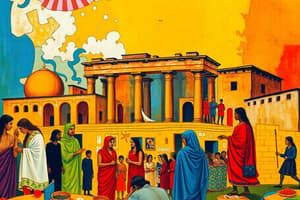Podcast
Questions and Answers
What does ancient history primarily focus on?
What does ancient history primarily focus on?
- The lives of common people in various cultures
- The interconnectedness of global historical events
- The development of modern economic systems
- Civilizations from prehistoric times to the Classical era (correct)
Which area of history examines the experiences and cultures of common people?
Which area of history examines the experiences and cultures of common people?
- Economic History
- Social History (correct)
- Cultural History
- Intellectual History
What type of sources are original documents and artifacts from the past considered?
What type of sources are original documents and artifacts from the past considered?
- Tertiary Sources
- Primary Sources (correct)
- Secondary Sources
- Analytical Sources
What does the study of Modern History encompass?
What does the study of Modern History encompass?
Which key concept in history emphasizes the sequence of events?
Which key concept in history emphasizes the sequence of events?
What characterizes historical analysis?
What characterizes historical analysis?
What is the significance of recognizing bias in historical accounts?
What is the significance of recognizing bias in historical accounts?
Which area of history looks at economic systems and trade?
Which area of history looks at economic systems and trade?
Flashcards
History
History
The study of past events, mostly in human affairs.
Ancient History
Ancient History
History from prehistoric times to the Classical era (e.g., Egypt, Greece, Rome).
Primary Source
Primary Source
Original documents/artifacts from the past (e.g., letters, buildings).
Secondary Source
Secondary Source
Signup and view all the flashcards
Historical Analysis
Historical Analysis
Signup and view all the flashcards
Chronology
Chronology
Signup and view all the flashcards
Causality
Causality
Signup and view all the flashcards
Historical Context
Historical Context
Signup and view all the flashcards
Study Notes
Overview of History
- History is the study of past events, particularly in human affairs.
- It encompasses a vast span of time, from the earliest human societies to the present day.
- Historians use various sources to understand past events, including written documents, archaeological artifacts, oral traditions, and other evidence.
- Historical narratives are often complex and multifaceted.
Key Areas of Study in History
- Ancient History: Focuses on civilizations and societies from prehistoric times to the Classical era (e.g., Egypt, Greece, Rome).
- Medieval History: Covers the period between the fall of the Roman Empire and the Renaissance (e.g., Feudalism, the Crusades).
- Modern History: Studies the period from the Renaissance to the present day, including major events like the Industrial Revolution, world wars, and social movements.
- Global History: Examines historical events and trends across the globe, emphasizing interconnectedness and diverse perspectives.
- Social History: Focuses on the lives of common people and social groups, uncovering their experiences, culture, and struggles.
- Cultural History: Explores the beliefs, values, and practices of different cultures throughout history.
- Economic History: Analyzes economic systems, trade, and development across various time periods.
- Intellectual History: Examines the development of ideas, philosophies, and intellectual currents over time.
Historical Methods and Approaches
- Primary Sources: Original documents and artifacts from the past (e.g., letters, diaries, photographs, buildings).
- Secondary Sources: Interpretations and analyses of the past, often based on primary sources (e.g., historical books, articles, scholarly journals).
- Historical Analysis: Close examination of sources to understand events and develop interpretations.
- Historical Context: Understanding historical events within their broader environments, including social, political, and economic factors.
- Bias and Interpretation: Recognizing that historical accounts are often influenced by the perspectives of historians and the limitations of available sources.
Key Historical Concepts
- Chronology: The sequence of events in time, crucial for understanding cause and effect.
- Causality: Investigating the relationships between events, identifying factors that contribute to historical change.
- Continuity and Change: Recognizing how societies persist and evolve over time.
- Perspectives and Interpretations: Acknowledging that there can be multiple valid interpretations of past events, contingent on the historical perspective.
Historical Significance
- Understanding the past helps us understand the present, identify patterns of change and recurring themes, and develop potential solutions to current challenges.
- The study of history promotes empathy, critical thinking, and informed citizenship.
- Historical learning enables us to analyze complex contexts, understand complex perspectives, and improve our ability to judge ethical dilemmas and solve issues.
Studying That Suits You
Use AI to generate personalized quizzes and flashcards to suit your learning preferences.




